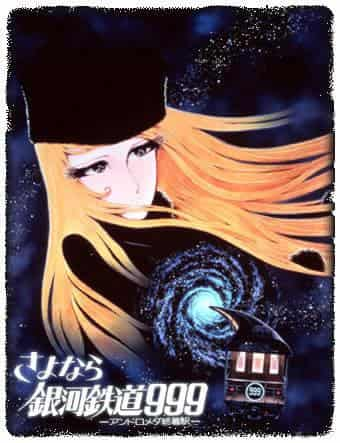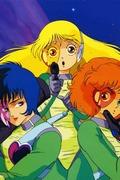The excitement and reviews of Galaxy Express 999 - A look back at the journey to the Andromeda Terminus

Appeal and evaluation of "Galaxy Express 999: Andromeda Terminus"■ Public Mediatheater ■ Original Mediacomics ■ Release dateAugust 1, 1981 - January 1, 0000 ■Distribution companyToei ■ Eirin Number110322 ■Frequencies130 min ■ Number of EpisodesEpisode 1 ■Original StoryReiji Matsumoto ■ DirectorRintaro ■ ProductionToei Animation ■ StoryEven though Planet Maetel was destroyed by Tetsuro's efforts, the power of the Mechanized People on Earth did not stop. In the midst of the battle between the Mechanized People and humans, Tetsuro receives a letter from Maetel. It asks him to get into the 999 again. Tetsuro and his friends get into the 999 again. The story unfolds as Tetsuro and Maetel get into the 999 again and go on a journey to pursue the "preciousness of limited life" through the battle against the Mechanized People. Following Maetel's letter, Tetsuro gets into the 999 with his friends and visits various planets, throwing himself into the battle against the Mechanized People. At the end of the story, Tetsuro and Maetel arrive at Andromeda Terminus Station and face the final battle. Through this battle, Tetsuro reaffirms the meaning of his own existence and his value as a living human being. Then, after saying goodbye to Maetel, Tetsuro sets off on a new journey. ■ExplanationThis is the second movie in the Galaxy Express 999 series. Most of the remaining mysteries, such as the reality of the Machine Empire, Maetel's past, and the identity of the conductor, are solved in this film. In addition, by bringing to a close the battle between flesh-and-blood humans and robots, it appeals to the viewers to understand the "preciousness of finite life," which is the theme of the series. This film is known for being directed by Rintaro, based on the original work by Leiji Matsumoto. Director Rintaro has succeeded in deeply moving the viewers by faithfully recreating the worldview of the original work while developing the story from his own perspective. In addition, the beautiful visuals by animation director Kazuo Komatsubara also enhance the appeal of this work. The music, including the theme song "SAYONARA," is also by Osamu Tojibayashi, and it adds to the atmosphere of the entire work. Furthermore, the acting of the cast is excellent, and in particular the voices of Tetsuro, played by Masako Nozawa, and Maetel, played by Masako Ikeda, resonate deeply with the viewers. ■Cast・Tetsuro Hoshino/Masako Nozawa ・Maetel/Masako Ikeda ・Conductor/Kaneta Kimotsuki ・Narrator/Tatsuya Shiro ■ Main staff・Executive producer: Tomonori Imada・Planning, original story, composition: Reiji Matsumoto・Planning: Ken Ariga, Yoshio Takami・Screenplay: Hiroyasu Yamaura・Chief animation director: Kazuo Komatsubara・Art director: Takamura Mukuo・Art: Tadao Kubota・Music: Osamu Tojibayashi・Director: Rintaro ■ Main Characters - Tetsuro A boy who goes on a journey with Maetel to obtain a mechanical body. Later, he gets on the 999 again after receiving a letter from Maetel. Tetsuro's mother was killed by a mechanized human, and he sets out on a journey driven by a desire for revenge. However, he meets many different people on his journey, which makes him question the meaning of his own existence. In the end, through his battle with the mechanized humans, he reaffirms his value as a flesh-and-blood human and sets off on a new journey. ■ Related works・TV anime "Galaxy Express 999" ■ Theme songs and music・TM ■ Evaluation and recommendation "Galaxy Express 999: Andromeda Terminus" is a grand science fiction fantasy based on the original work by Matsumoto Leiji, and is a work that deeply moves viewers. Director Rintaro's skillful direction, Komatsubara Kazuo's beautiful drawings, and Tokairin Osamu's music all work together to enhance the appeal of the work as a whole. The acting by the cast is also superb, and the voices of Nozawa Masako and Ikeda Masako in particular resonate deeply with viewers. This work is a story that pursues the "preciousness of finite life" through the battle against the mechanized people, and conveys many messages to the viewers. In particular, Tetsuro's growth and his farewell to Maetel are scenes that deeply move the viewers. |
<<: Doraemon the Movie "I Am Momotaro" Review: A moving story and fascinating characters
>>: Mysterious! A thorough evaluation of the horror legend of Frankenstein
Recommend
HBO's series "Watchmen" released its first stills! Mysterious man appeared
According to foreign media reports, the HBO serie...
Spider-Man: Into the Spider-Verse's new stills will have 6 different styles that will surprise the audience
Recently, Empire magazine released new stills of ...
"Captain Marvel" is scheduled to be released in China and North America at the same time
Marvel's first superhero movie of 2019, "...
New stills from the live-action movie "The Way of the Househusband" released, to be released on June 3
Adapted from the popular manga, which was made in...
The appeal and reviews of "Macross Dynamite 7": A must-see for fans?
Macross Dynamite 7 - Basara Nekki's New Adven...
Attack No.1: A tearful spinning receive - A look back at the moving scenes
"Attack No.1: A Tearful Spinning Receive&quo...
SARFT donates to Hubei again: 15 excellent TV series are broadcast for free
According to recent media reports, the State Admi...
Detective Conan: The Scarlet Bullet - Is it the best of the series? A thorough analysis of the appeal of the 25th installment!
Detective Conan: The Scarlet Bullet - Movie Revie...
The comic-adapted movie "Golden Kamuy" has a new trailer and will be officially released next year
Today (November 29), Toho officially released a n...
The first poster of "Nezha: The Devil Child Conquers the Dragon King" is released, Nezha emerges from the fire!
Three years ago, the domestic animated film "...
"The Yin-Yang Master: Dream of Eternity" box office exceeded 300 million. Guo Jingming's works have always had low ratings and high box office.
The movie "The Yin-Yang Master: Dream of Ete...
The new trailer of the movie "Refuse to Define" tells the story of a prostitute and will be released on November 13
The Japanese film "Refuse to Be Defined"...
The appeal and reviews of "THE SOUL TAKER": The world of anime chasing the souls of the abyss
The appeal and evaluation of "THE SOUL TAKER...
The official trailer of the action drama "Queen" focuses on 18th century African female warriors
Recently, the official trailer of the historical ...
Marvel will soon plan the next decade of MCU movies
The Marvel Cinematic Universe, which includes a s...









